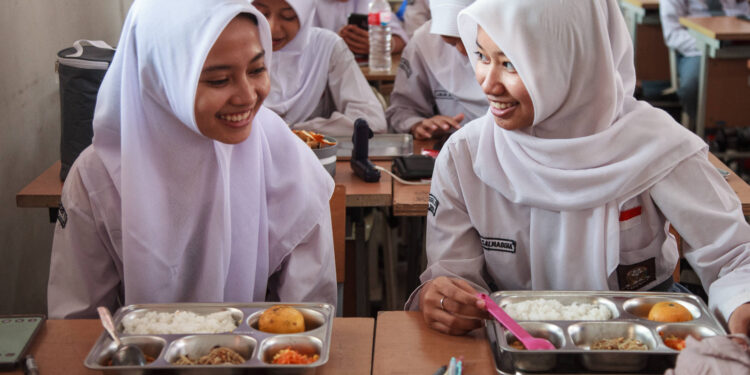Indonesia has kicked off 2025 with a groundbreaking initiative that aims to reshape the future of its youth. The country’s newly launched Free Nutritious Meal Program is set to provide free lunches and milk to 83 million students and pregnant women—a move designed to combat malnutrition and improve educational outcomes across the nation.
The need for such a program is urgent. According to current estimates, 20% of Indonesian children under five are stunted, and 1 in 12 suffer from low weight, conditions closely tied to poor nutrition. During his October inauguration speech, President Prabowo Subianto highlighted the stark reality many Indonesians face: “Too many of our brothers and sisters are below the poverty line, too many of our children go to school without breakfast and do not have clothes for school.”
This program aims to change that. With an initial budget of $4.3 billion, the government plans to distribute nutritious meals to students in more than 400,000 schools nationwide. The menu will include 6.7 million tons of rice, 500,000 tons of beef, and 4 million kiloliters of milk, ensuring students get the essential nutrients they need to grow, learn, and thrive. Dadan Hindayana, head of the newly established National Nutrition Agency, emphasized that the program goes beyond just feeding kids—it’s about setting them up for a brighter, healthier future.
The initiative isn’t without challenges. Some critics have raised concerns about the program’s long-term affordability and logistical hurdles. However, President Subianto remains confident: “We are capable.” By tackling poverty and malnutrition at the roots, the government hopes to foster a generation of healthier, more focused students, ultimately propelling the nation forward.
This bold step also reflects a global push for addressing hunger and malnutrition as core issues in education and health. Similar programs, like Brazil’s National School Feeding Program, have shown that providing meals can lead to better school attendance, improved concentration, and even enhanced community well-being. If Indonesia succeeds, it could serve as a model for other nations grappling with similar challenges.
For a deeper dive into this transformative program and its potential impact, check out the full story from the Associated Press.
As Indonesia feeds its young, it’s also feeding the hope for a stronger, more prosperous tomorrow.





















Your point of view caught my eye and was very interesting. Thanks. I have a question for you.
Thank you, your article surprised me, there is such an excellent point of view. Thank you for sharing, I learned a lot.
Can you be more specific about the content of your article? After reading it, I still have some doubts. Hope you can help me. https://www.binance.info/pt-PT/register?ref=DB40ITMB
Thanks for sharing. I read many of your blog posts, cool, your blog is very good.
Thanks for sharing. I read many of your blog posts, cool, your blog is very good.